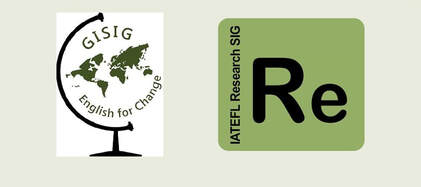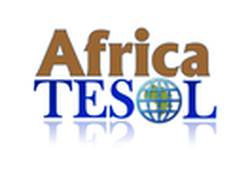ReSIG-GISIG project with Africa TESOL: supporting teachers to do research
ReSIG and GISIG have jointly organised an Africa TESOL Pre Conference Event in Abuja, Nigeria on 8th August 2019. This event offered hands-on workshops on doing teacher research on global issues which are relevant to the realities of the teachers involved.
This was a workshop on action research led by Amira Salama during the PCE in Abuja on 8th August 2019
Following this event, ReSIG together with Africa TESOL are offering mentoring to the teachers who participated in the PCE events and wish to conduct research on their own classrooms.
As part of this mentoring scheme we have organised 4 webinars through the IATEFL platform and individual support from mentors from ReSIG and Africa TESOL which will be offered in September 2019 - January 2020. Below is information about the webinars:
As part of this mentoring scheme we have organised 4 webinars through the IATEFL platform and individual support from mentors from ReSIG and Africa TESOL which will be offered in September 2019 - January 2020. Below is information about the webinars:
Webinar Presenters
|
Richard Smith (University of Warwick, U.K.) co-founded the TELCnet (Teaching English in Large Classes research and development network – http://bit.ly/telcnet-home) in 2008 and was coordinator of the IATEFL Research SIG from 2011 to 2015. He has led teacher-research initiatives in Chile, India and Nepal, producing a number of Open Access books including Teaching in Low-resource Classrooms: Voices of Experience and A Handbook for Exploratory Action Research.
Sian Etherington (University of Salford, U.K.) Dr Siân Etherington is a teacher developer at the University of Salford. She currently works with new members of academic staff in helping them to develop their teaching, and has previously taught undergraduate and postgraduate TESOL modules and supervises Applied Linguistics and TESOL PhD students. She is interested in the role of emotion in teaching and is working on a British Council research project on emotion and teacher well-being. She has been part of the RESIG committee since 2013, holding the role of treasurer until last year.
Kenan Dikilitas (University of Stavanger, Norway). Former joint Co-ordinator of the IATEFL ReSIG. He has published articles and edited books on teacher research as a professional development strategy. He has also conducted teacher research projects and has given hands-on workshops on how to do educational research across Turkey and overseas. His teacher training experience primarily includes supporting teacher research for professional development. His primary research interests are language teacher education, educational research, research into language teaching and learning, and linguistics for teaching pedagogy.
|
Webinars
Webinar 1 (Saturday 21 Sep at 20.30 pm UK Time) – Developing research questions (by Richard Smith)
This session will help participants to:
* understand the value of exploring before attempting to bring about a change
* develop research questions to explore a pedagogical issue of concern to them
Webinar PowerPoint slides
Webinar 1 recording (starts at 3:39)
Webinar 1 (link for mobile phones)
Webinar 2 (Sunday 6 Oct at 19.30 pm UK Time) – Practical tools for exploratory research (by Richard Smith)
This session will help participants to:
* consider different sources of information ('data') for different types of question
* decide what kinds of data will help them answer their research questions
Second Webinar PowerPoint slides (with a few explanatory headings added)
Webinar 2 recording
Webinar 2 (link for mobile phones)
Webinar 3 (Friday 22 Nov at 18.00 pm UK Time)- introduces basic data analysis methods (by Sian Etherington) .
This session will support teachers in analysing their research data. We will consider some common approaches to data analysis, dealing with both quantitative and qualitative data. There will be some short pre-webinar tasks to complete.
Third Webinar PowerPoint slides
Webinar 3 recording
Webinar 3 (link for mobile phones)
Topics:
Webinar 4 (Friday 31Jan 19.00 pm UK Time)- discusses the interpretation of the findings including (by Kenan Dikilitas)
Webinar 4 recording
This session will help participants to:
* understand the value of exploring before attempting to bring about a change
* develop research questions to explore a pedagogical issue of concern to them
Webinar PowerPoint slides
Webinar 1 recording (starts at 3:39)
Webinar 1 (link for mobile phones)
Webinar 2 (Sunday 6 Oct at 19.30 pm UK Time) – Practical tools for exploratory research (by Richard Smith)
This session will help participants to:
* consider different sources of information ('data') for different types of question
* decide what kinds of data will help them answer their research questions
Second Webinar PowerPoint slides (with a few explanatory headings added)
Webinar 2 recording
Webinar 2 (link for mobile phones)
Webinar 3 (Friday 22 Nov at 18.00 pm UK Time)- introduces basic data analysis methods (by Sian Etherington) .
This session will support teachers in analysing their research data. We will consider some common approaches to data analysis, dealing with both quantitative and qualitative data. There will be some short pre-webinar tasks to complete.
Third Webinar PowerPoint slides
Webinar 3 recording
Webinar 3 (link for mobile phones)
Topics:
- ways of analysing qualitative and quantitative data
- developing creative ways of data display to present the findings
- creating coherence while presenting analysis
Webinar 4 (Friday 31Jan 19.00 pm UK Time)- discusses the interpretation of the findings including (by Kenan Dikilitas)
- reflecting on developing new understandings of teaching and professional development
- identifying potential ways of understanding the existing practices and the areas of improvement that can be made.
Webinar 4 recording
Africa TESOL Research Group
In this Africa-TESOL ReSIG video, four participants share their learning experiences in conducting teaching research. Annette, Ita, Rethabile, and Ruth share their classroom research projects, which include students’ participation in class, developing academic writing, and the use of pidgin English in public secondary school.
These teacher research projects share a common finding: Teachers and learners' collaboration is critical to make (language) teaching and learning a long-lasting, bonding, and meaningful experience.
These teacher research projects share a common finding: Teachers and learners' collaboration is critical to make (language) teaching and learning a long-lasting, bonding, and meaningful experience.
Further details about this project can be found on the Africa TESOL website
Mentors and organising committee: Harry Kuchah, Ana Ines Salvi, Kenan Dikilitas, Amol Padwad, Sian Etherington, Amira Salama, Ishraga Bashir, Okon Effiong, Loreto Aliaga
We will be updating this information as the project moves forward.
Regards,
Ana Ines Salvi on behalf of the organising committee
We will be updating this information as the project moves forward.
Regards,
Ana Ines Salvi on behalf of the organising committee




